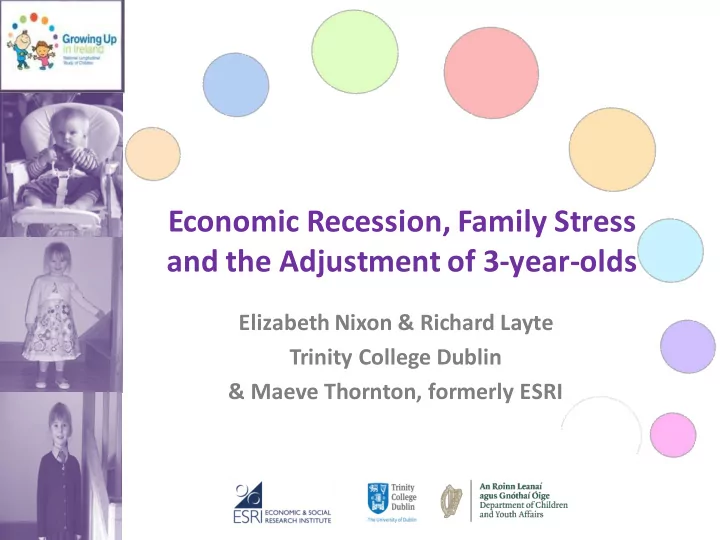

Economic Recession, Family Stress and the Adjustment of 3-year-olds Elizabeth Nixon & Richard Layte Trinity College Dublin & Maeve Thornton, formerly ESRI
Economic Recession • Long history of research on the effects of socio-economic disadvantage on children’s development • Limited research on direct effects of recession on children’s outcomes at a population level o Instability and change in economic state of families are likely to contribute to family instability and chaos o Investments in children may occur more intermittently: reducing consumption and investments in children’s education and other activities are common responses to economic shocks o Reductions in fiscal resources available to governments may affect service delivery across a range of areas pertinent to the lives of children • Timing of data collection coincided with onset of the ‘Great Recession’ in Ireland (2008)
Family Stress Model Economic Strain – gives psychological meaning to the stressful experience of economic hardship Conger et al, 2010
’08 (Infant) Cohort of Growing up in Ireland Infant Cohort Random sample drawn from Child Benefit Register Population 73,362 • 11,134 • Interviewed between September 2008 and April 2009 9 months • 69% positive response rate of valid contacts made • 9,793 • Interviewed between December 2010 and June 2011 3 years • 87.96% retention rate • 9,001 • Interviewed between December 2012 and June 2013 5 years • 91.91% retention rate (from Wave 2; 80.84% from Wave 1) • Inter-wave contact, postal questionnaire only • Completed between October 2015 and February 2016 7 years • Full home and school-based assessment • Completed between March 2018 and August 2018 9 years
Economic Strain • Economic Strain – gives psychological meaning to the stressful experience of economic hardship • “Difficulty making ends meet” – 61% of families; 14% in arrears on utility bills, 9% in arrears on rent/mortgage • Change in income is important for experiences of economic strain…. but is not the only factor 60 54 50 42 41 41 40 % of households 34 34 30 25 18 20 11 10 0 Lower quintile Same quintile Higher quintile Less strain Same strain More strain
Economic Strain • Wage reduction per se not associated with economic strain • Strongest predictors were – Cutting back on basics – Cutting back on luxuries – Arrears on rent/mortgage – Arrears on utility bills – Redundancy of either parent – Being in a single parent household – Lower level of maternal education – Working hours reduced – Social welfare reduced
Effects of Economic Strain
Effects of Economic Strain on Depressive Symptoms 30 26.1 25 % of parents classified as 'depressed' 20 18 15 10.7 10.6 9.5 9.2 10 5.8 4.5 4.3 5 3.7 2.8 2.7 2.2 1.7 0 With great difficulty With difficulty With some difficulty Fairly easily Easily Very Easily Overall Difficulty making ends meet (Economic Strain) Mother Father
Effects of Economic Strain on Depressive Symptoms Strong effects of economic strain on mothers’ depressive symptoms Having to cut back on basic necessities, and being in arrears were also directly associated with depressive symptoms for mothers For fathers: • In arrears on utility bills • Redundancy (of mother or father) associated with higher depressive symptoms • Having social welfare reduced • Not being able to afford luxuries
Effects of Economic Strain on Marital Satisfaction Mothers’ economic strain and depressive symptoms were the strongest predictors of marital dissatisfaction. Older mothers had lower marital satisfaction, but satisfaction was higher when a new child had been born between waves of the study. For fathers, the only economic variable associated with marital satisfaction was having working hours reduced: this was associated with lower levels of marital satisfaction Fathers’ depressive symptoms were also associated with marital satisfaction. Older fathers had lower marital satisfaction and fathers with more children, and where a new child had been born between waves had higher marital satisfaction
Spill-over effects into parenting? Comparing depressed/non-depressed mothers and fathers - small differences in warmth, bigger differences in hostility Similar patterns in terms of those with ‘distressed’ relationships Does this matter for children’s outcomes?
Children’s Adjustment Difficulties Externalising …and Internalising Mother hostility Mother hostility Father hostility Mother depression Positive associations Mother depression Recent migrant Recent migrant Higher levels of mat education Higher levels of mat education New child born btw waves Mother warmth Mother warmth Negative associations Mother age Mother age Mother marital satisfaction Father warmth Father warmth Mother marital satisfaction Father hostility Non-significant Father depression Father depression associations Father marital satisfaction Father marital satisfaction Child gender Child gender
What can we conclude? Strain is highest when families are in arrears and have to cut back on basic necessities Important associations with psychological distress… and marital dissatisfaction Questions remain about the stability of these difficulties over time - will they leave lasting effects over time? Or will economic recovery be associated with a dissipation of these difficulties? Parental mental well-being plays a key role in bridging the link between distal macro-level economic circumstances and children’s relationships and outcomes Spill-over effects point to the importance of supporting parents who are experiencing psychological distress
Recommend
More recommend